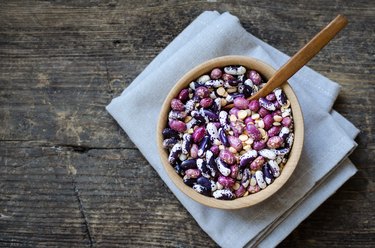
Gallbladder attacks may cause debilitating pain. Nausea, vomiting, jaundice, fever and inflammation are all common symptoms. Even though most attacks subside within two or three days, the pain and discomfort can be excruciating; you might not be able to work, eat, move around and perform your daily tasks. One way to prevent flare-ups and manage your symptoms is to follow a gallbladder diet that limits alcohol, fatty foods, fried foods and sugar.
Tip
Some foods, especially fruits and vegetables, may help prevent gallbladder attacks and reduce flare-ups. Others, such as fatty meat and sugary desserts, can worsen your symptoms.
Video of the Day
Read more: Can Sugary Foods Make Gallbladder Problems Worse?
Video of the Day
What Is a Gallbladder Attack?
The gallbladder is a small pear-shaped organ located just below the liver. Its primary role is to store bile and then slowly release it into your intestines. The body needs this yellowish-brown liquid to metabolize fats and absorb some vitamins. When you're in a fasting state, about 80 percent of hepatic bile is stored in your gallbladder.
Gallstones, gallbladder infection, cholecystitis and other health conditions affecting this organ can trigger an attack. A high-fat diet, for example, may lead to the development of gallstones and cause a temporary blockage of the bile ducts, which can last from 15 minutes to several hours. If you have gallstones, you may develop inflammation in the gallbladder — or cholecystitis, which can cause fever, nausea, sharp abdominal pain, chills and fatigue.
According to a 2018 review published in the journal Current Opinion in Gastroenterology, one in five people with gallstones will develop symptoms, including pain attacks. It's estimated that 10 to 15 percent of American adults have this condition; about 70 percent of gallstones are formed from cholesterol. Knowing what foods to avoid with gallbladder issues can make it easier to prevent flare-ups and reduce stone formation.
Read more: Gallstone & Gallbladder Sludge Symptoms
Switch to a Gallbladder Diet
Whether you have gallstones or other gallbladder problems, you may need to change your eating habits. Some foods can reduce the frequency and intensity of pain attacks, while others can worsen your symptoms. Furthermore, junk food and sugary treats contribute to obesity, which is a major risk factor for gallstones.
According to a 2015 report featured in the European Journal of Human Genetics, women with obesity are more likely to develop gallbladder disease. Obesity Action notes that at least a quarter of individuals with severe obesity have gallstones. Even though weight loss alone isn't enough to treat these problems, it may help reduce flare-ups and complications.
Since most gallstones result from cholesterol buildup, it makes sense to reduce your fat intake. A gallstone diet should be low in fat and include mostly whole foods. Eating fatty meats, packaged baked goods, potato chips and other processed fatty foods may increase the risk of developing a gallbladder attack. On the other hand, fruits, vegetables, legumes, lean meat and fish may help prevent gallstones and their symptoms.
What Can You Eat?
The best foods for preventing gallbladder attacks should be minimally processed and low in fat. According to a 2016 study featured in HHS Author Manuscripts, vegetable protein may lower the risk of gallbladder disease and aid in weight management. Researchers point out that a high fat intake contributes to this disorder. Soybeans, lentils, chickpeas, quinoa and other plant-based protein sources contain less significantly less fat when compared to animal protein; therefore, they may be suitable for a gallbladder diet.
Read more: Vegan Diet for the Gallbladder
Ideally, choose foods that are high in fiber. Your gallstone diet may include green leafy vegetables, canned vegetables, fresh and dehydrated fruits, sprouted nuts and seeds, bananas, sweet potatoes, whole grains, legumes, lean meat and fish. The dietitians at HealthLinkBC recommend low-fat milk and dairy and removing the skin from poultry.
According to Penn State Health, diets rich in fiber, omega-3s and vitamin C may lower the risk of gallstones. Regular consumption of almonds, walnuts, peanuts and other nuts is recommended. These foods are high in dietary fiber and monounsaturated fats that help lower triglyceride and cholesterol levels. Coffee appears to be beneficial due to its ability to stimulate gallbladder contractions and reduce cholesterol in bile; other caffeinated beverages, though, don't have the same effect.
- MSD Manuals: Cholecystitis
- Connecticut Academy of Family Physicians: The Spectrum of Gallbladder Disease
- Florida Medical Clinic: Recognizing the Symptoms of a Gallbladder Attack
- Current Opinion in Gastroenterology: Incidence of Gallstone Disease and Complications
- Best Practice Journal: Biliary Colic and Complications From Gallstones
- EuropePMC: Lipids, Obesity and Gallbladder Disease in Women
- Obesity Action: Obesity and Gallstones: How Are They Related?
- University Health News: What Does a Gallbladder Attack Feel Like?
- Preventive Medicine: Vegetable Protein Intake Is Associated With Lower Gallbladder Disease Risk
- HealthLinkBC: Eating Guidelines for Gallbladder Disease
- Penn State Health: Gallstones and Gallbladder Disease
- NIH: Can what I eat help prevent gallstones?
- Medical News Today: Diet tips for a healthy gallbladder
- WebMD: Understanding Gallstones - Prevention